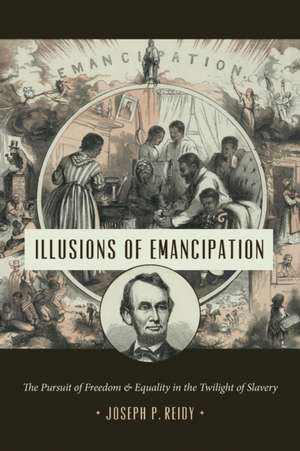Illusions of Emancipation
Autor Joseph P. Reidyen Limba Engleză Paperback – aug 2020
In this sweeping reappraisal of slavery's end during the Civil War era, Joseph P. Reidy employs the lenses of time, space, and individuals' sense of personal and social belonging to understand how participants and witnesses coped with drastic change, its erratic pace, and its unforeseeable consequences. Emancipation disrupted everyday habits, causing sensations of disorientation that sometimes intensified the experience of reality and sometimes muddled it. While these illusions of emancipation often mixed disappointment with hope, through periods of even intense frustration they sustained the promise that the struggle for freedom would result in victory.
Preț: 272.20 lei
Nou
Puncte Express: 408
Preț estimativ în valută:
52.09€ • 56.56$ • 43.76£
52.09€ • 56.56$ • 43.76£
Carte tipărită la comandă
Livrare economică 23 aprilie-07 mai
Preluare comenzi: 021 569.72.76
Specificații
ISBN-13: 9781469661568
ISBN-10: 146966156X
Pagini: 520
Dimensiuni: 156 x 234 x 30 mm
Greutate: 0.79 kg
Editura: The University of North Carolina Press
ISBN-10: 146966156X
Pagini: 520
Dimensiuni: 156 x 234 x 30 mm
Greutate: 0.79 kg
Editura: The University of North Carolina Press
Notă biografică
Joseph P. Reidy is professor emeritus of history at Howard University.
Descriere
In this sweeping reappraisal of slavery's end during the Civil War era, Joseph Reidy employs the lenses of time, space, and individuals' sense of personal and social belonging to understand how participants and witnesses coped with drastic change, its erratic pace, and its unforeseeable consequences.
